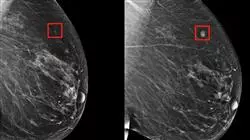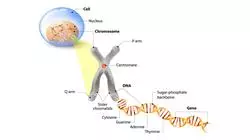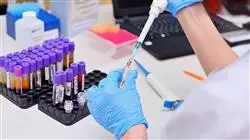University certificate
The world's largest faculty of medicine”
Description
A high quality postgraduate diploma that will provide you with the knowledge you need in clinical genetics in nephrourological, pediatric and cancer diseases, with the most extensive and up-to-date knowledge in the sector"

Between 5 and 10% of cancers are hereditary. Several hereditary cancer syndromes are currently known to affect diverse families. The consequences of cancer in general are devastating; therefore, it is essential to provide knowledge of the different syndromes of hereditary neoplasms and to know the criteria for identifying those families susceptible of carrying mutations in genes with a high risk of predisposition to hereditary cancer.
A wide variety of hereditary renal and urological diseases are currently known. These diseases affect children and adults alike and, in some cases, are often diagnosed in childhood, but their final stage does not develop until maturity. Advances in molecular genetics have considerably changed the classification of hereditary glomerular or cystic kidney diseases.
If we were to quantify the impact of genetic diseases at all ages of life we would see that: in 50% of first trimester abortions a chromosomal alteration is found; 2-3% of newborns have a congenital abnormality and, of these, at least 50% are genetic in origin; in developed countries, they are responsible for 20-30% of pediatric hospital admissions and 40-50% of infant mortality. Pediatric genetics plays a fundamental role and, therefore, we intend to offer a detailed and comprehensive approach to the most common diseases in this area, as well as to teach about the different tools that currently exist to provide diagnostic assistance, such as dysmorphology, its management, usefulness and limitations. In addition to deepening in the different existing and developing algorithms for the selection of diagnostic techniques in pediatrics at the genetic level.
A broad compendium of knowledge that you will be able to acquire in an efficient way through this high-quality postgraduate diploma"
This online postgraduate diploma offers you the benefits of a high-level scientific, educational and technological course. These are some of its most notable features:
- Latest technology in online teaching software
- Highly visual teaching system, supported by graphic and schematic contents that are easy to assimilate and understand
- Practical cases presented by practising experts
- State-of-the-art interactive video systems
- Teaching supported by telepractice
- Continuous updating and recycling systems
- Self-regulating learning: full compatibility with other occupations
- Practical exercises for self-evaluation and learning verification
- Support groups and educational synergies: questions to the expert, debate and knowledge forums
- Communication with the teacher and individual reflection work
- Content that is accessible from any fixed or portable device with an Internet connection
- Supplementary documentation databases are permanently available, even after the course
A training program that masterfully combines intensity and flexibility, making its objectives easily and comfortably achievable for the professional"
This program has been developed by professionals from different clinical genetics clinics in which they contribute their experience in daily practice, in the care of patients and families with a variety of hereditary disorders, both in genetic counseling and in prevention programs and prenatal and preconception counseling. The faculty involved in the postgraduate diploma also carries out important research work in the field of Genetics.
The postgraduate diploma addresses, in its different modules, the basic and necessary knowledge for the management of patients and their diseases in a clinical genetics practice. It offers a practical approach to the different techniques most commonly used for the diagnosis of hereditary diseases, as well as the interpretation of their results. It offers an approach to the diseases that cause the highest number of consultations in daily practice in a Clinical Genetics service.
The diploma contains theoretical text about the subject matter, and practical examples taken from clinical cases that will facilitate understanding and the acquisition of in-depth knowledge.
Increase your decision-making confidence by updating your knowledge with this University Expert course.

You will be trained by professionals with extensive experience in the sector, who have contributed all their knowledge and experience in the development of this program"
Objectives
Currently not all hospitals have genetics units and it is foreseeable that all healthcare centers will have genetics units in the coming years. Students in this program will deepen the knowledge required to work as clinical geneticists both in the field of diagnosis and counseling in these units or to be part of multidisciplinary groups of medical services, where patients with hereditary diseases are treated.

Learn about the advanced approach to nephrourological, pediatric and hereditary cancer diseases in a clinical genetics service"
General Objectives
- Know the historical evolution of knowledge in the area of genetics.
- Learn the use of genetic analysis for diagnostic purposes.
- Learn about all known hereditary cancer syndromes.
- Learn about all known hereditary cancer syndromes.
- Recognize genetic diseases affecting the sensory organs and know how to manage them.
- Detail the molecular basis and mechanisms for the diagnosis of endocrine diseases.
- Know the genetic diseases affecting the central and peripheral nervous system.
- Learn about genetic nephrourological diseases, such as Fabry disease or Alport Syndrome.
- Addressing the different major pediatric diseases.
- Review hematological, metabolic and deposit, cerebral and small vessel diseases.
Specific Objectives
Module 1: Hereditary Cancer
- Provide the student with the necessary tools for the acquisition of knowledge of the criteria for the identification of families with susceptibility to the different hereditary cancer syndromes.
- Identification of individuals at risk.
- Plan protocols with early prevention programs as well as the different risk-reducing surgery techniques and areas of their application.
- Specialize in the risk of transmission to offspring
- Develop preimplantation genetic diagnosis in cancer.
Module 2: Genetics of Nephro-urological Diseases.
- Provide global training in the most common nephrological and urological pathologies.
- Comprehensive approach for its identification and clinical diagnosis considering previous explorations, both analytical and anatomo-pathological studies already performed as well as other complementary explorations.
Module 3: Genetics of Pediatric Diseases
- Understand in depth the concepts in Dysmorphology.
- Deepen in a dysmorphological exploration.
- In-depth understanding of congenital malformations.
- Study the main pediatric syndromes.
- Detect inherited disorders of metabolism.

Postgraduate Diploma in Pediatric Nephrourological Diseases and Hereditary Cancer in Clinical Genetics.
Pediatric nephrourologic diseases and hereditary cancer are areas of clinical genetics that focus on the study of hereditary diseases of the renal, urologic and cancer systems that are transmitted from generation to generation.
Pediatric nephrourologic diseases are those that affect the renal and urinary system in children and adolescents. Examples include polycystic kidney disease, autosomal recessive kidney disease, and congenital renal failure.
Hereditary cancer refers to cancers that originate from genetic alterations inherited from parents. Examples include hereditary breast cancer, hereditary nonpolypoid colon cancer and Lynch syndrome.
Clinical genetics is responsible for studying and diagnosing these diseases, and provides genetic counseling to affected families. In the case of pediatric nephrourologic diseases, clinical genetics can help identify inherited diseases in families with a history of them, and assess the risk of disease recurrence in future pregnancies.
In the case of hereditary cancer, clinical genetics can help identify individuals at high risk of developing cancer due to a genetic predisposition, and provide advice in making decisions about preventive testing or medical interventions. Clinical genetics is fundamental in the diagnosis, prevention and treatment of pediatric nephrourological diseases and hereditary cancer, improving the quality of life of affected patients and families.
TECH the world's largest digital university has a specialized academic program designed to provide students with strong clinical genetics skills and expertise in the diagnosis and management of nephrourological, pediatric and hereditary cancer disorders. Students will learn to apply advanced molecular diagnostic and genetic techniques for the diagnosis and treatment of inherited disorders and work in multidisciplinary teams to provide a comprehensive approach to patient care.







